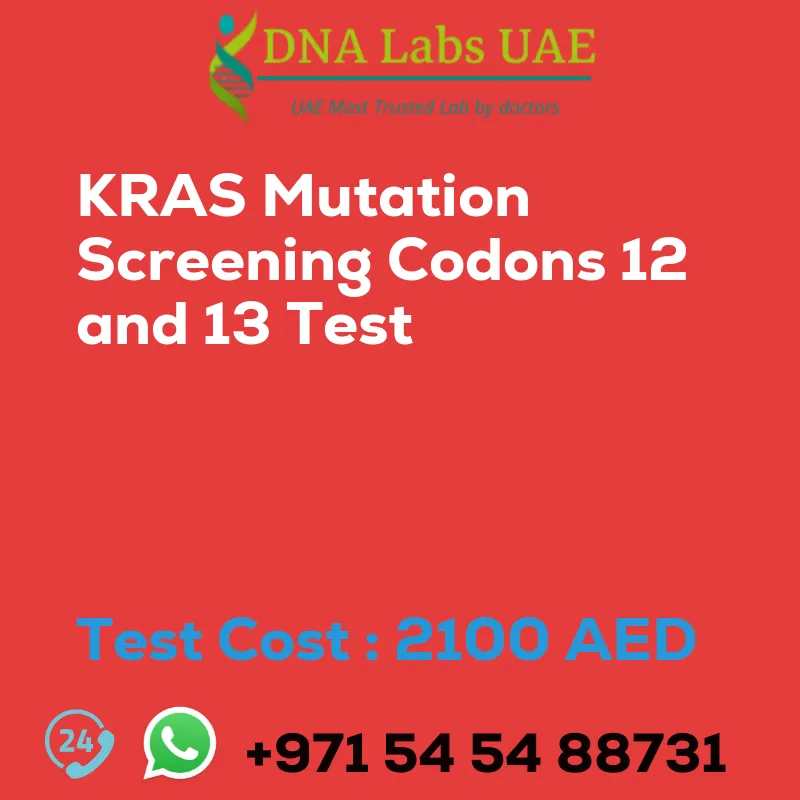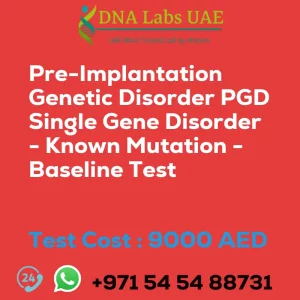KRAS Mutation Screening Codons 12 and 13 Test
Test Name: KRAS Mutation Screening Codons 12 and 13 Test
Components: Paraffin embedded tissue blocks
Price: 2100.0 AED
Sample Condition: Tumor tissue
Report Delivery: 7-8 days
Method: Sanger Sequencing
Test Type: Genetics
Doctor: Gynecologist
Test Department:
Pre Test Information: KRAS Mutation Screening (Codons 12 & 13) can be done with a Doctor’s prescription. Prescription is not applicable for surgery and pregnancy cases or people planning to travel abroad.
Test Details
KRAS mutation screening is a molecular diagnostic test used to detect specific mutations in the KRAS gene. This test focuses on two specific codons, codon 12 and codon 13, which are known to be hotspots for mutations in the KRAS gene.
The KRAS gene encodes a protein called KRAS, which is involved in regulating cell growth and division. Mutations in the KRAS gene can lead to the production of a dysfunctional KRAS protein, which can contribute to the development and progression of certain types of cancer, particularly colorectal cancer.
Codons 12 and 13 are regions within the KRAS gene where mutations frequently occur. These mutations can result in a change in the amino acid sequence of the KRAS protein, leading to its constitutive activation. Constitutively active KRAS proteins can continuously signal for cell growth and division, even in the absence of normal growth signals, promoting uncontrolled cell proliferation and tumor formation.
KRAS mutation screening tests typically use techniques such as polymerase chain reaction (PCR) or DNA sequencing to identify specific mutations in codons 12 and 13 of the KRAS gene. By detecting these mutations, healthcare providers can determine if a patient’s tumor is likely to respond to certain targeted therapies, such as anti-EGFR (epidermal growth factor receptor) monoclonal antibodies.
In summary, KRAS mutation screening (codons 12 and 13) is a molecular diagnostic test that identifies specific mutations in the KRAS gene. This information can help guide treatment decisions for patients with certain types of cancer, particularly colorectal cancer.
| Test Name | KRAS Mutation Screening Codons 12 and 13 Test |
|---|---|
| Components | Paraffin embedded tissue blocks |
| Price | 2100.0 AED |
| Sample Condition | Tumor tissue |
| Report Delivery | 7-8 days |
| Method | Sanger Sequencing |
| Test type | Genetics |
| Doctor | Gynecologist |
| Test Department: | |
| Pre Test Information | KRAS Mutation Screening (Codons 12 & 13) can be done with a Doctors prescription. Prescription is not applicable for surgery and pregnancy cases or people planing to travel abroad. |
| Test Details |
KRAS mutation screening is a molecular diagnostic test used to detect specific mutations in the KRAS gene. This test focuses on two specific codons, codon 12 and codon 13, which are known to be hotspots for mutations in the KRAS gene. The KRAS gene encodes a protein called KRAS, which is involved in regulating cell growth and division. Mutations in the KRAS gene can lead to the production of a dysfunctional KRAS protein, which can contribute to the development and progression of certain types of cancer, particularly colorectal cancer. Codons 12 and 13 are regions within the KRAS gene where mutations frequently occur. These mutations can result in a change in the amino acid sequence of the KRAS protein, leading to its constitutive activation. Constitutively active KRAS proteins can continuously signal for cell growth and division, even in the absence of normal growth signals, promoting uncontrolled cell proliferation and tumor formation. KRAS mutation screening tests typically use techniques such as polymerase chain reaction (PCR) or DNA sequencing to identify specific mutations in codons 12 and 13 of the KRAS gene. By detecting these mutations, healthcare providers can determine if a patient’s tumor is likely to respond to certain targeted therapies, such as anti-EGFR (epidermal growth factor receptor) monoclonal antibodies. In summary, KRAS mutation screening (codons 12 and 13) is a molecular diagnostic test that identifies specific mutations in the KRAS gene. This information can help guide treatment decisions for patients with certain types of cancer, particularly colorectal cancer. |








